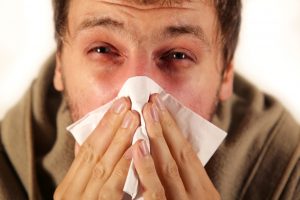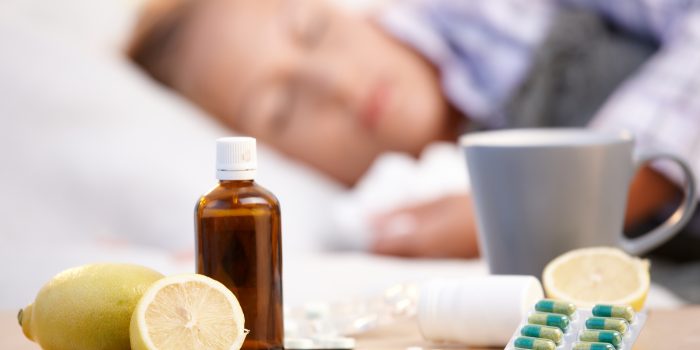Many people experience upper respiratory problems, whether it’s coughing, sneezing, nasal congestion, and all of these other conditions that could be accompanied by headaches and other muscle aches. More often than not, we either categorize what we’re feeling as allergies, the cold, or the flu. Then we start taking medicine or take the necessary steps to solve whatever condition we think we’re experiencing.
The reality is that allergies, cold, and the flu actually share very similar symptoms. When you find yourself sneezing for instance, you could actually be suffering from either of the three. It could be flu at its early stages, the common cold, or perhaps you’re just suffering from allergies.
Knowing how to determine which condition you’re really suffering from can help you make better decisions. When it comes to what medication to take and how to get better, the first step is always knowing exactly what you’re solving.
Here are some of the shared symptoms that you need to differentiate:
1. Clogged or Runny Nose
 When your nose is stuffy or running, it could be one of the three. The common cold is obviously characterized by this symptom, but not all people who suffer from flu will have a clogged or runny nose. It’s also worth noting that when you’re suffering from seasonal allergies, this runny nose is also usually itchy.
When your nose is stuffy or running, it could be one of the three. The common cold is obviously characterized by this symptom, but not all people who suffer from flu will have a clogged or runny nose. It’s also worth noting that when you’re suffering from seasonal allergies, this runny nose is also usually itchy.
2. Watery Eyes
 Sometimes, having a common cold will be accompanied by watery eyes, and in the case of the flu, this usually comes with fever. When you have allergies, this is manifested as itchy and burning apart from being watery.
Sometimes, having a common cold will be accompanied by watery eyes, and in the case of the flu, this usually comes with fever. When you have allergies, this is manifested as itchy and burning apart from being watery.
3. Sneezing
 Whether you’re suffering from allergies, the common cold, or the flu, you will always find yourself sneezing. For those with flu, sneezing is a symptom that occurs sometimes, but for allergies and the common cold, expect it already.
Whether you’re suffering from allergies, the common cold, or the flu, you will always find yourself sneezing. For those with flu, sneezing is a symptom that occurs sometimes, but for allergies and the common cold, expect it already.
4. Fatigue, exhaustion, and weakness
 This is one telltale symptom that distinguishes the three. When all you’re experiencing is allergies, you will rarely feel this if at all. Sometimes, those with the common cold will feel tired, but when you have the flu, you will surely find yourself extremely exhausted and it could still last for a couple of days, even after recovery.
This is one telltale symptom that distinguishes the three. When all you’re experiencing is allergies, you will rarely feel this if at all. Sometimes, those with the common cold will feel tired, but when you have the flu, you will surely find yourself extremely exhausted and it could still last for a couple of days, even after recovery.
5. Headache
 Headache can be experienced in all three cases, but the kind and intensity often differ. When it’s allergies, what you feel is often stuffiness or pressure from the sinuses that often extend to the head. The common cold will sometimes give you a headache as well, but when it’s the flu you’re sure to have a headache, and sometimes this headache is unfortunately severe in nature.
Headache can be experienced in all three cases, but the kind and intensity often differ. When it’s allergies, what you feel is often stuffiness or pressure from the sinuses that often extend to the head. The common cold will sometimes give you a headache as well, but when it’s the flu you’re sure to have a headache, and sometimes this headache is unfortunately severe in nature.
6. Fever
 Allergies won’t give you fever, so if you feel hot that means you either have the cold or the flu. Fever that accompanies the common cold is usually mild, but if it’s flu you will often have temperatures of 100 degrees or even higher.
Allergies won’t give you fever, so if you feel hot that means you either have the cold or the flu. Fever that accompanies the common cold is usually mild, but if it’s flu you will often have temperatures of 100 degrees or even higher.
7. Chills
 The intense chills that come with flu are only sometimes present (and mild) when it comes to the common cold. If you’re just experiencing allergies, you won’t feel chills at all.
The intense chills that come with flu are only sometimes present (and mild) when it comes to the common cold. If you’re just experiencing allergies, you won’t feel chills at all.
8. Diarrhea and vomiting
 Flu is often accompanied by diarrhea and vomiting, and this is not something you experience when you simply have the common cold or allergies. So when you find yourself always vomiting and having a hard time with your bowels, along with all the other related symptoms, then it’s very likely you have flu.
Flu is often accompanied by diarrhea and vomiting, and this is not something you experience when you simply have the common cold or allergies. So when you find yourself always vomiting and having a hard time with your bowels, along with all the other related symptoms, then it’s very likely you have flu.
9. Body aches
 When you have colds or flu, you will often find that you also feel some aches and pains in some parts of your body. These body aches are normal symptoms of the condition, and it also contributes to why you suddenly feel so tired. When you just have allergies however, you won’t be experiencing this.
When you have colds or flu, you will often find that you also feel some aches and pains in some parts of your body. These body aches are normal symptoms of the condition, and it also contributes to why you suddenly feel so tired. When you just have allergies however, you won’t be experiencing this.
10. Cough
 Cough is another common symptom that all three share, but there are some ways to differentiate. When it’s the common cold, you will experience mild to moderate coughing. When it’s the flu, you will definitely cough a lot, and sometimes the coughing can become severe. Allergies are often accompanied by dry or minimal music.
Cough is another common symptom that all three share, but there are some ways to differentiate. When it’s the common cold, you will experience mild to moderate coughing. When it’s the flu, you will definitely cough a lot, and sometimes the coughing can become severe. Allergies are often accompanied by dry or minimal music.
Knowing all of these determining factors, it will be easier for you to categorize whether it’s seasonal allergies, the common cold, or the flu. Since the flu is clearly harder to deal with, it’s also best if you get flu shots even before you experience any of these symptoms.
The good news is that it’s not at all difficult to find a place where you can get flu shots. You can go to the pharmacy section of any supermarket such as Publix or even straight to the CVS Flu Shot Service. When you’re armed with a flu shot in your system, there will be less chances of you getting infected and perhaps you won’t even have to worry about any of these symptoms.


